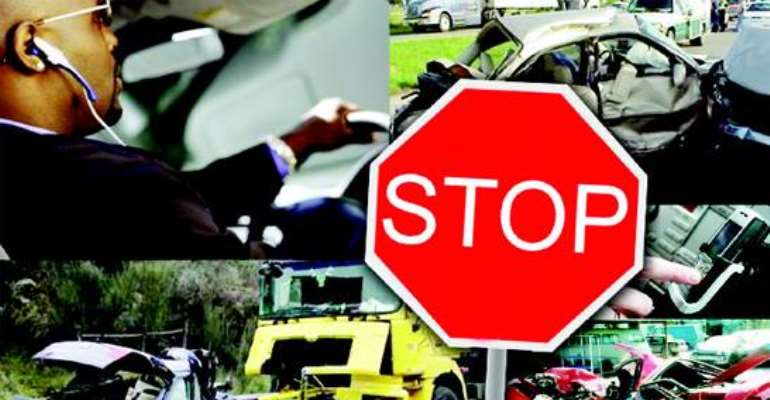HOW HANDS-FREE CELL PHONE CAUSES ACCIDENTS

Obviously, many fatal road accidents have been caused by drivers talking on cell phones while driving. That is why doing that is prohibited in most countries.
In countries where the police and other officials responsible for road safety monitor compliance with the ban, drivers who cannot just stop talking on the steering usually cheat on the law by talking with hands-free cell phones.
But the use of hands-free device while driving also consititutes its own risks. For instance, in June 2008 in the United Kingdom, a 49-year-old man, Marvyn Richmond, was jailed for causing a fatal crash while talking on a Bluetooth headset.
Richmond was said to be so engrossed in a conversation with his mother that he failed to notice that traffic ahead of him had come to a standstill. He ploughed into the traffic, killing Mr. Michael Buston, a passenger in a van; his brother-in-law, Peter Long, who was in a transit van with him, was badly injured; and the driver of the lorry at the front of the queue, Andrejz Matkowski, lost both arms.
In fact, a research conducted by the UK's Transport Research Laboratory in 2009 found that motorists who talked on hands-free phones were more dangerous than drink-drivers.
Unfortunately, the use of hands-free devices behind the wheels is not prohibited in most countries - even though drivers can be prosecuted if they drive dangerously when distracted by a hands-free call.
Drivers using the legal alternative to hand-held mobiles, the research found, were 30 per cent slower to react than those slightly over the limit. And for up to 10 minutes after a conversation, their reflexes remained dull.
The study, according to the Mail of London, suggested that millions could be unwittingly risking their own and others' lives while obeying the law on phone use in a vehicle.
As part of the research, drivers were asked to brake suddenly while travelling at 70mph.
Someone over the alcohol limit took 13 feet longer to come to a halt than a normal driver. But a hands-free kit user took an extra 26 feet-twice as far-before stopping.
Tests on concentration and how long it took for the brain to fully focus found the hands-free driver had a 30 per cent slower reaction time than the over-the-limit one.
The researchers said any kind of conversation in a car reduced the driver's concentration levels for up to 10 minutes after it had ended.
Unfortunately, many drivers seem unaware of the danger. For instance, in a poll also conducted by the researchers, drivers were asked about the 'danger rating' of various behind-the-wheel activities. They gave using a hands-free kit a score of three out of ten.
Both eating sweets and smoking were rated as more risky. Mrs. Maggie Game, an official of the insurer, Direct Line, which commissioned all the research, said, 'This study will understandably come as a shock to many drivers who currently use a hands-free device to comply with the law.
'Hopefully now that drivers are aware of the dangers inherent in the use of hands-free mobile phones whilst driving, the act of having any but the most crucial conversations will take on the status of a social taboo in much the same way that drink-driving has.'
The UK road safety charity, Brake, said the findings reinforced its calls for a complete ban on all phone use while driving.
Spokesman Sarah Fatica was quoted by the Mail of London, 'Research shows us that it's all about the effect it has on concentration and not about having one less hand on the wheel. We hope this research makes the general public stop and think about the importance of that phone call and think that no call is worth a life.'
Similarly, a research by psychologists from the University of Uttah, United States found that using a handset on speaker phone, or fitted with a headset, while driving, causes a drop in concentration equivalent to being over the drink-drive limit.
Motorists using the legal devices took almost a fifth longer to hit the brakes in an emergency and were shown to be less aware of traffic around them, according to the research published last March in the journal, Psychonomic Bulletin and Review.
Dr. Jason Watson and Dr. David Strayer said their findings were important because they prove the vast majority of people can't do more than one thing at a time.
But while this is true for 97.5 per cent of drivers, the researchers discovered that 2.5 per cent of their subjects were 'supertaskers' who were able to do two things at once.
But Watson warned that the odds of being a supertasker are about as good as the chances of flipping a coin and getting five heads in a row.
The Public Education officer in the Federal Road Safety Commission, Mr. Samuel Opeyemi, agreed that using hands-free devices while driving is not safe. Though he said that it was not an offence in the country, he warned that it could be as distracting as using hand-held cell phone.
He said, 'We have not carried out such a research in the country but it is all about concentration while driving. Talking on phone while driving is dangerous whether you are using hands-free or not. If you were driving and you received a call that someone close to you had died, it would definitely cause you to lose your concentration and at that time anything can happen.'
